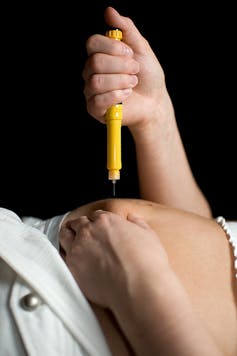Women are generally born with about a million eggs. Yet, women with reproductive problems or “older” women (over the age of 40) often cannot conceive with their own eggs. The solution is to use donor eggs because it can improve their chances of pregnancy.
The problem is, the demand for egg donors in Australia has increased significantly over the years and donor eggs are in short supply.
So, should women who donate their eggs for reproduction be compensated? This controversial question has been asked repeatedly in Australia ever since Britain changed its laws on compensation for egg donation this year. In my view, the answer is yes.
In April, the maximum rate of compensation for British eggs donors rose from £250 (A$385) to £750 (A$1155). As a result, the number of women who have approached clinics to donate eggs “surged”. The increase in donations has also reduced the waiting times for women who require donor eggs for procedures such as in-vitro fertilisation (IVF), a process of fertilising eggs with sperm outside of a woman’s body.
In Australia, the law prevents individuals from buying or selling any human tissue and this includes eggs, sperm and embryos. To that end, women cannot be paid for donating their eggs. They may only be paid for “out-of-pocket” expenses associated with donation such as travelling to the clinic and taking time off work. Women cannot be compensated for the inconvenience or risk associated with donation.
As a result of our legal regulations, it’s very difficult to find an altruistic donor in Australia. The waiting lists are interminably long (many lists have been closed given the critical demand for donor eggs) and women must often find their own donor, such as a friend or relative.
For women who cannot find an altruistic donor at home, increasingly, the solution is to become a reproductive tourist and travel to countries such as India, where egg donors and surrogates are compensated and there are virtually no waiting times for eggs.
There is something wrong with this picture. While I think it’s unethical to pay egg donors $10,000 or more as they are in some clinics in the United States (“high demand” donors in the US are paid up to $50,000), it is not justified to avoid compensating donors altogether.
Egg donation is a time-consuming, invasive procedure. A potential donor will have to travel to a clinic several times for various tests before she is even accepted as a donor.

If she is accepted, she will have injections to stimulate her ovaries to mature her eggs for retrieval. During this time, she will require more examinations to monitor her response to the fertility drug. Side effects of the drugs may be mild to severe, including enlarged ovaries and bloating. In the most serious cases, a donor could experience blood clotting and fluid in the lungs.
Eggs are retrieved from the donor surgically. This can take up to one hour and donors often report feeling mild pelvic discomfort afterwards.
Women should be compensated for being inconvenienced and risking their health.
Exploitation and commodification
There are generally two arguments against compensation: women might be exploited if they are offered large sums of money to donate; and paying donors for eggs commodifies the human body, meaning it turns it in to a product to be sold in the marketplace.
Getting paid a lot of money to donate eggs could be tempting for women to donate. But this does not mean it’s necessarily coercive or exploitative.
If we view payment as compensation for a donor’s inconvenience and risk and not payment for a product (eggs), then it would be impossible to justify the high sums paid to donors in the US, for example, because every donor is equally inconvenienced by the process.
Furthermore, the majority of egg donors in the West are middle class women. So it’s unlikely that the “typical” donor in Australia has “no choice” but to sell her eggs.
With regard to the commodification argument, every service in our economy is sold. If there is something wrong with commodifying eggs as per Australian law, then we also could argue that it is also wrong to pay for reproductive services altogether.
The bottom line is that if payments that are too high “exploit” women, then payments that are too low or non-existent are equally exploitative. Why is it that egg donors are expected to act altruistically when everyone else involved in the process is compensated for their work?
The key question is how much should Australian donors be compensated. Paying up to $5,000 in a carefully regulated market, for example, would recognise the inconveniences associated with donation and make it worthwhile for egg donors.
As in Britain, compensation will also reduce the waiting times for donated eggs in Australia and the number of couples that go overseas for fertility services. Let’s treat donors with the respect that they deserve.

